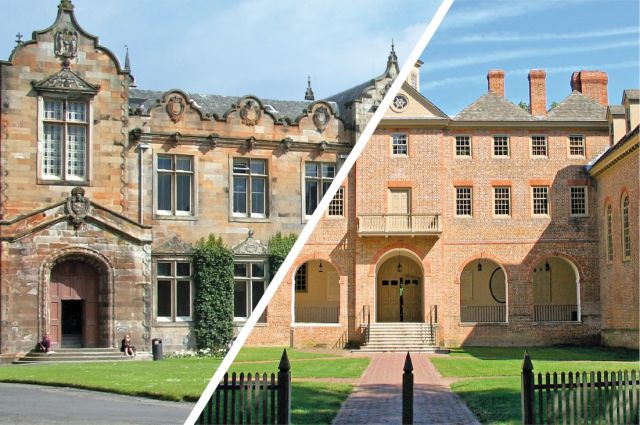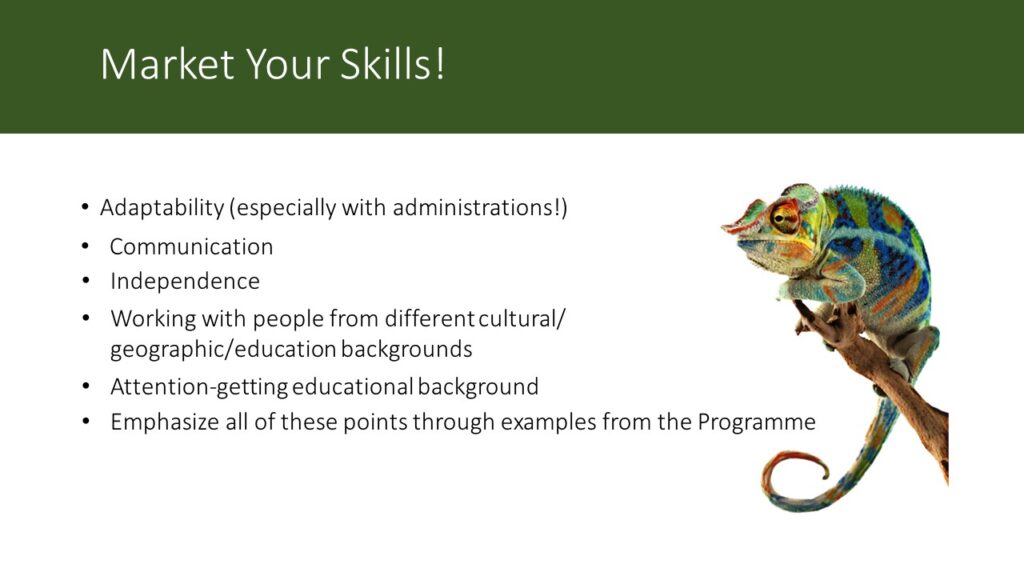Although I haven’t posted about it recently, my assistantship at the Career Center (now known as the Office of Career Development and Professional Engagement) has been keeping me quite busy. After spending last semester getting acquainted with the JDP experience, I’ve been spending this semester making my own contributions in two different ways: creating new workshop content, and bolstering student alumni-relations. Let’s take a look at the first one today.

I started thinking about new content last semester while talking with the Program’s Peer Advisors, seniors who organize social events and other opportunities for JDP students. Since my assistantship is only ten hours a week, I knew the Peer Advisors would be an invaluable resource for getting first-hand perspectives on how students experience the program and what kinds of resources they’d like to see from the Career Center.
By far the biggest request I heard was to create workshops catering to the different majors. Although students appreciated the general advice offered in workshops such as “Translating the JDP Experience,” they wanted more career suggestions for their particular fields. After all, although there are generalities that can be applied to all the majors, there are also pretty field-specific things students need to know about, such as the fact that economics-related internships have much earlier deadlines, or that International Relations students should consider bolstering their quantitative skills through mathematics and coding.
In response to these requests, I agreed to develop three brand-new, virtual workshops based on the JDP’s majors: International Relations, Economics, and Humanities (English, History, Film, and Classical Studies. Ideally each of these would have gotten its own presentation, but knowing my own finite hours I grouped them all into one). Like last semester’s workshop, these would be illustrated PowerPoint presentations, but the content would be more specific to each field. They’d focus less on describing the JDP experience on resumes or cover letters, concentrating instead on the opportunities available to students in different majors and the kinds of skills they should consider developing.
Given my own background in art history and museums, I knew that my knowledge of the current job market, while useful, was limited in its perspective, and that I’d need to learn more about career exploration for economics, international relations, and other majors. Over the next couple of months, I spent time online perusing both the Career Center’s materials and various websites learning about everything from current job outlooks to suggestions for graduate school.

But by far my most invaluable resource was the JDP alumni body itself. I initially started networking with graduates last semester through LinkedIn, as part of a larger effort to build up student-alumni relations. But once I started putting together the workshops, I realized I had a crucial resource at my fingertips. After all, who would know more about navigating the job market as a JDP graduate than an actual alum? Who would know better than anyone else the unique advantages and disadvantages of the joint degree programme?
So I put my networking into action by reaching out to them. I compiled a survey asking questions about their post-JDP experiences, inquiring specifically about how the programme had helped them, what skills they’d wished they had developed during their enrollment, and what upcoming graduates should know about the job and grad school markets. I also asked if they’d be available to participate in future programs, such as the workshops themselves, or an alumni panel I’d begun planning for later in the semester.
The result was, to invoke the timeworn cliche, a treasure trove of information. When it came to their responses, the alumni were thorough, often offering paragraph-long answers to each of my questions. The responses they provided contained exactly the kind of specific information I had hoped to collect, from the kinds of coding languages students should consider learning, to different platforms for expanding their networks. As a result of these responses, I felt much more confident about the content I was putting together, knowing that the insights and suggestions I provided would reflect the input of JDP alumni.

Over the next few weeks, I incorporated the alumni feedback into three PowerPoint presentations. I divided each workshop into four sections. Part three, career exploration, highlighted the kinds of job possibilities available to JDP students. Part two, skills and experience, pointed out the transferable skills JDP students have already honed through the program, suggested new skills they should consider learning, and ways to get practical experience, including but not limited to internships. Part three discussed graduate school, including whether or not they should seriously pursue it, and what kinds of degrees to consider getting if they do. Part four wrapped up the workshop with networking, explaining why it’s important, and how to do it through in-person contacts, virtual platforms such as LinkedIn, and the various options available at the Career Centers at both St Andrews and William & Mary. To give students a head-start on their networking, I also invited alumni to join the workshop during the last few minutes, asking them to share their perspectives while encouraging current students to ask questions.
I offered all three workshops during the month of March. Knowing that students are pretty engrossed with final papers and projects by April, I wanted to offer the workshops earlier in the semester, before students became overwhelmed with academic obligations, while still giving myself enough time to create quality material. I started with Economics on March 2nd, as I wanted to get in one presentation before Spring Break. On March 23rd, I offered the workshop on International Relations, since between a research trip and Spring Break immediately after that I wasn’t in the office to give another workshop. Finally, I offered the workshop on Humanities on March 30, right at the end of the month. All three workshops were virtual, and they each took place at 12 pm ET, so that students from the St Andrews campus could attend at a reasonable hour. I also recorded each workshop so that students who couldn’t attend could listen at their own convenience.
Overall, I’m happy with how these workshops turned out. I’m glad that I was able to lean on alumni to fulfill the students’ requests for more specific information. Additionally, asking the graduates for contributions complemented my ongoing project of building student-alumni networks within the JDP experience, so the questionnaire ultimately served multiple purposes. While there were a lot of topics I didn’t address, such as work visas and questions about immigration, these can be the topics for future workshops. Indeed, I’ve already compiled a survey for current students asking what kind of programming they’d like to see next semester, so there will be no shortage of opportunities for new workshops. To me, these three workshops aren’t an end, but a beginning. Through new programs and the ongoing revision of current offerings, it’s my hope that the Career Center will continue to offer a rich array of programming for JDP students long after my assistantship there has ended.
Yet this isn’t all I’ve been doing. Later this month I’ll share how I’ve been contributing to expanding the JDP’s student-alumni relations beyond the workshops, so stay tuned.